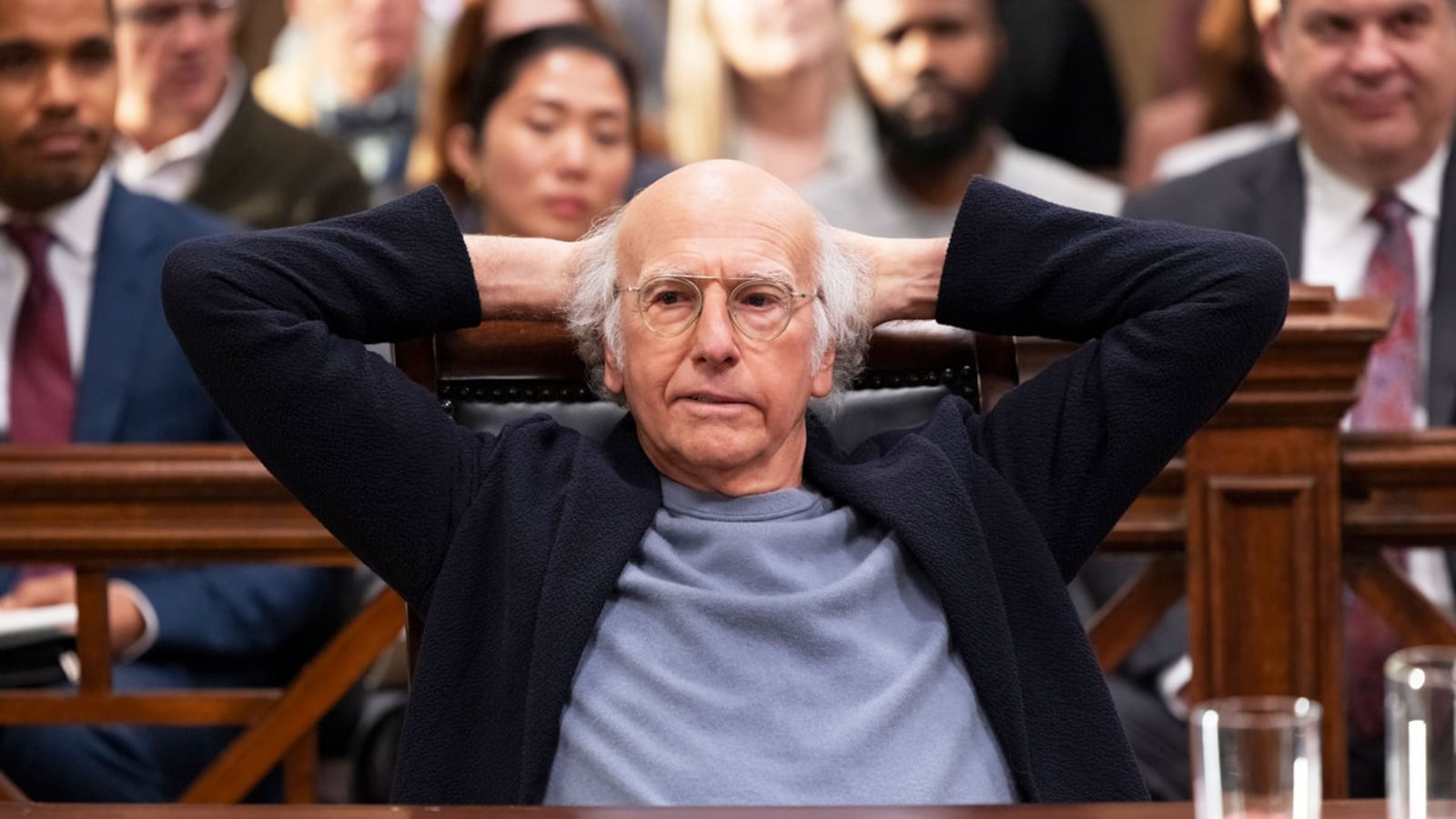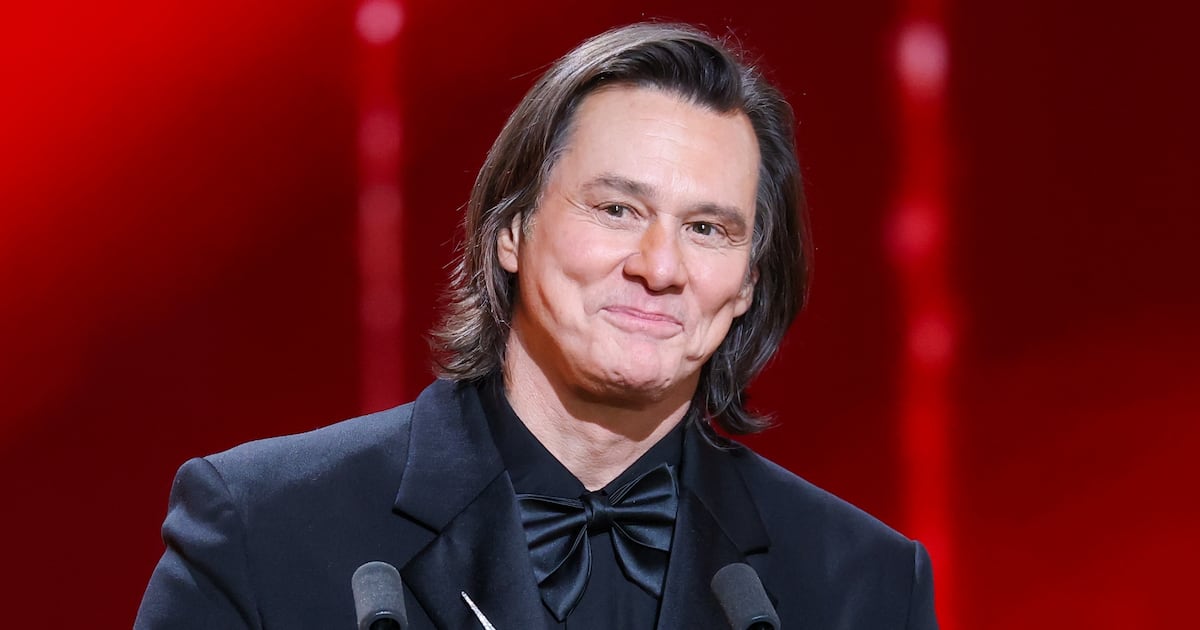He really did it. And then, funnier still, he corrected it too.
After 12 seasons and nearly 25 years, Larry David brought HBO’s Curb Your Enthusiasm to a close on Sunday night, using his beloved series’ finale as a way to both thumb his nose at critics who’ve long decried Seinfeld’s last episode, and to prove that despite his on-screen persona’s notorious intractability, he was an old dog who could learn at least one new trick.
As television fans undoubtedly remember, Seinfeld concluded with the hour-long trial of Jerry, George, Elaine, and Kramer, who—following a cavalcade of courtroom witnesses who slammed them for their selfish insensitivity (replete with clips!)—were sent to prison for their sins. By punishing his beloved protagonists for the very qualities that had given audiences so much amusement, David (who penned the send-off) refused to provide the happily-ever-after that so many TV icons before the quartet had received, and which viewers naturally expected. You liked them because they were creeps, he told Americans—admit and embrace it!
Curb Your Enthusiasm has always played like a prolonged reaffirmation of that sentiment, except that in this instance, David himself not only embodied his predecessors’ worst traits and tendencies, but he amplified them to hilariously excruciating degrees. Over the course of the past two-plus decades, David has said and done more inappropriate things than any character in the history of the medium. As a result, as the end of his show drew closer and David continued to find himself embroiled in a legal scandal—this one involving Georgia’s Election Integrity Act, which he violated by giving Leon’s Auntie Rae (Ellia English) a bottle of water as she waited in line to vote—it was difficult not to think that he was setting up a farewell that would allow him to once again double down on his comedy’s (and character’s) unapologetic awfulness.

Susie Essman and Larry David
John Johnson / HBOSunday night’s finale was dubbed “No Lessons Learned,” and David made sure to hammer home that title’s point via his story, in which he travels to Atlanta to face justice. In the lobby of a hotel, he’s hit by a ball thrown by a child, and as the boy’s mother tries to coax him into apologizing, an impatient David speeds up the process by admitting, “I am 76 years old and I have never learned a lesson in my entire life!” Later, in response to Larry harping on an issue in typical can’t-let-it-go fashion, the perpetually fed-up Susie remarks, “When have you ever learned a lesson?” In its swan song, Curb was determined to emphasize Larry’s stubborn refusal to change or to grow, and the fact that it simultaneously had Leon opting (at the eleventh hour!) to finally binge-watch Seinfeld was an additional tip-off that a remake was in the works.
That it was, as most of Curb’s final chapter focused on Larry and his lawyer (Sanaa Lathan) fighting an uphill battle against a folksy southern prosecutor (Greg Kinnear) before a judge (Dean Norris) and jury. Per Seinfeld tradition, the trial involved numerous figures from David’s past—from Mocha Joe (Saverio Guerra) and Takahashi (Dana Lee) to the little girl (now all grown up) who once received an unseemly hug from David in a public bathroom—taking the stand to decry him for his horrid behavior, all of which was seen in flashback clips. Through it all, David remained completely unfazed, not only because he’s a narcissist incapable of admitting he’s wrong, but also because he was busy doing what he’s always done: complain about various supposed slights and—in the case of a ruse involving a wheelchair-bound Susie—indulging in underhanded tactics to help his cause.

Jeff Garlin
John Johnson / HBOCurb’s finale was, in some ways, as scattershot as many of this twelfth season’s installments, as its action was jam-packed with half-hearted subplots: David growing frustrated that Richard’s Lewis’ reunited-after-years girlfriend (Allison Janney) screwed him over in traffic, and then challenging her claims of attempted suicide; David badmouthing Ted Danson for protesting outside the courthouse simply to elicit media acclaim; and David and Jeff scamming Auntie Rae out of her secret salad dressing recipe so Jeff could gift it to Susie for their anniversary. Most of these were distractions from the main event, although, like every gag in the episode, they underscored what everyone has long known, expected, and adored about David: He’s a petty, curmudgeonly, me-first pain in the ass.

J.B. Smoove and Larry David
John Johnson / HBODavid’s decision to wrap up Curb by riffing on Seinfeld made perfect sense since the two series were always creatively joined at the hip, the former a more unhinged extension of the latter. Thus, it was fitting that Jerry himself eventually arrived to show his support for his old pal—which really just amounted to the duo joking about whether they would date a bearded lady if, beneath her bushy facial hair, she was a stunner. Jerry’s appearance was a welcome delight, and his back-and-forth with Leon about the secret “tapes” of on-screen Jerry’s sexual escapades was as funny as anything the series has produced this year. Moreover, it allowed for the ultimate do-over, albeit with a twist: having been found guilty and sentenced to a year in prison for his misdeed (and, really, for his rottenness), David is saved from the clink by Jerry, who tellingly informs him: “You don’t want to end up like this. Nobody wants to see it. Trust me.”
On their way out of the slammer, David and Jerry share an ah-ha moment that this is how they should have concluded Seinfeld. It’s here, in Curb’s closing minutes, that the comedian finally does learn his lesson, recognizing that what fans loved most about his two TV series was watching their incorrigibly egotistical, cruel, and buffoonish protagonists be themselves and then get away with it, free to wreak havoc for another day. As such, it both celebrated its Seinfeld roots and one-upped them, leaving us not with the amusing sight of its hero rebuked for his misdeeds, but of him and his equally impossible friends bickering insanely to the end.






